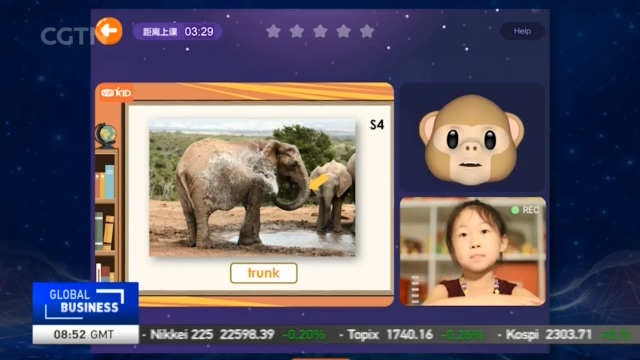
17:23, 09-Aug-2018
AI in Education: VIPKID teams up with Microsoft
Updated
17:03, 12-Aug-2018
03:58

Turning to education. In terms of technology adoption, education has remained in the beginning stage compared with other sectors such as e-commerce and new retail. And now, companies are trying to implement artificial intelligence to improve the quality and effectiveness of learning. Let's take a look at how AI is working in the world's schools.
Another deal involving AI. And this time, it's in education. Microsoft recently signed a partnership with VIPKID concerning products and technology development. VIPKID is a Beijing-based English learning platform for children from the ages of four to twelve. The platform reached more than half million students and 60 thousand teachers, with offices in nine countries, including South Korea, Japan and Vietnam.
ZHANG YANJING, VP OF TECHNOLOGY VIPKID "The application of AI is relatively low in the education sector. It only took 17 percent in 2017, far lower compared with the e-commerce and logistics sectors. The data is not that clear and logical to be collected than in e-commerce."
ZHANG ZIJIAN, ASSOC. PROFESSOR SCH. OF COMPUTER SCIENCE AND TECHNOLOGY, BIT "AI education can be more smart in the future, and can be personalized to each student based on their own personality and cognition level. Traditional education is usually one teacher with thirty or forty students, which is impossible to take care of every student's different features."
As one of the early AI pioneers, Microsoft has teamed up with HP and its Dynamics 365 AI solution to transform customer support experiences. Now, it will help VIPKID in students' behavior and teaching quality analyses.
Zhang Qi said that VIPKID is far more than just an online English learning platform--it is a tech company, and a big data company. Zhang Yanjing agrees. He said that they collected tens of millions of hours of students' speaking samples, and have been training their AI model to understand facial expressions.
ZHANG YANJING, VP OF TECHNOLOGY VIPKID "Interactivity and involvement are crucial in online education. We developed a complicated algorithm to analyze students' eyes and how they move. And we train the model through deep learning. Each student has different ways to express feelings, so the feedback could be very different."
WANG XIAOZHOU BEIJING "As AI is more and more involved in education, how we human-beings could make sure what we are taught is what we wanted to be taught? How much of control we can still have? Or is there going to be one day, that AI could finally have the tables turned and have it all?"
Experts don't seem to worry that much. They believe that the first principle of AI is to augment people's abilities rather than replace human beings.
ZHANG ZIJIAN, ASSOC. PROFESSOR SCH. OF COMPUTER SCIENCE AND TECHNOLOGY, BIT "I'd rather consider AI as a challenge, not a threat to human. I would see it as a part of evolution. If we could get better off with it, why not to learn from them?"
DR ZHANG QI, SENIOR DEPUTY HEAD MICROSOFT STC ASIA "Talking about how AI would help people, to set people free to do more creative work."
Let imaginations run wild, experts say, ultimately, AI could even become a new species. If people are carbon-based beings, then AI could be silicon-based beings. Their advantage is that they can't make mistakes and never get tired. But we humans have our own advantage too--we understand humans better. Wang Xiaozhou, CGTN.

SITEMAP
Copyright © 2018 CGTN. Beijing ICP prepared NO.16065310-3
Copyright © 2018 CGTN. Beijing ICP prepared NO.16065310-3